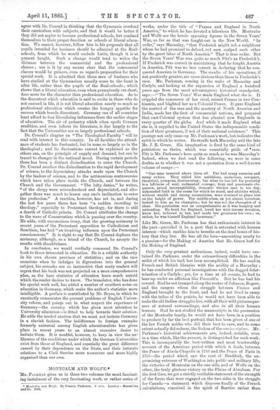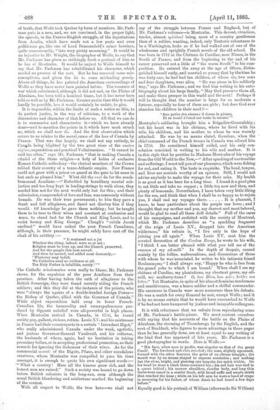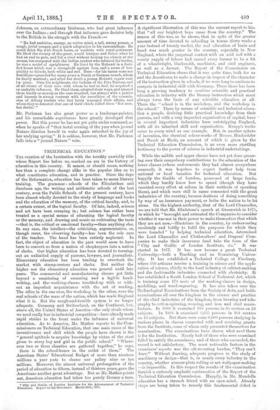MONTCALM AND WOLFE.*
P.a.1111MAN gives us in' these two volumes the most fascinating instalment of the very fascinating work, or rather series of
works, under the title of " France and England in North America," to which he has devoted a laborious life. Montcalm and Wolfe are the heroic opposing figures in the Seven Years" War, so far as that was fought-out in the New World. "In order," says Macaulay, "that Frederick might rob a neighbour whom he had promised to defend, red men scalped each other by the great lakes of North America." That is true so far. But the Seven Years' War was quite as much Pitt's as Frederick's.
If Frederick was correct in maintaining that he fought Austria in America, Pitt was no less correct in declaring that he con quered America in Germany. The results of his operations, if not positively greater, are more obvious than those in Frederick's case. Mr. Parkman, coming in the wake of Macaulay and Carlyle, and looking at the expansion of England a hundred years ago from the most advantageous historical standpoint, says :—" The Seven Years' War made England what she is. It crippled the commerce of her rival, ruined France in two Con tinents, and blighted her as a Colonial Power. It gave England the control of the seas and the mastery of North America and India, made her the first of commercial nations, and prepared that vast Colonial system that has planted new Englands in every quarter of the globe. And while it made England what she is, it supplied to the United States the indispensable condi tion of their greatness, if not of their national existence." This passage not only sums-up Mr. Parkman's work, but indicates the spirit in which he writes. He recalls both Macaulay arid the late Mr. J. R. Green. His imagination is fired by the same kind of patriotism as theirs, which was essentially pride of • race. Pitt is Mr. Parkman's hero quite as much as he was Macaulay's. Indeed, when we first read the following, we were in some doubts as to whether it was not a quotation from a well-known volume of essays :
" One man towered above them all. Pitt had many enemies and many critics. They called him ambitious, audacious, arrogant, theatrical, pompous, domineering ; but what he has left for posterity is a loftiness of soul, undaunted courage, fiery and passionate eloquence, proud incorruptibility, domestic virtues rare in his day, unbounded faith in the cause for which he stood, and abilities which, without wealth and strong connections, were destined to place him on the height of power. The middle-class, as yet almost voiceless, looked to him as its champion; but he was not the champion of a class. His patriotism was as comprehensive as it was haughty and unbending. He lived for England, loved her with intense devotion, knew her, believed in ber, and made her greatness his own ; or, rather, he was himself England incarnate."
Like Mr. Green, Mr. Parkman has that enthusiastic interest in the past—provided it be a past that is saturated with human interest—which enables him to breathe on the dead bones of his tory that they live. He has all the love—amounting nearly to• a passion—for the Making of America that Mr. Green had for the Making of England.
Only the very greatest enthusiasm, indeed, could have sus tained Mr. Parkman under the extraordinary difficulties in the midst of which his task has been accomplished. He has read in French and British libraries with the avidity of a Macaulay ; he has conducted personal investigations with the dogged deter
mination of a Carlyle ; yet, for a time at all events, ho had to bear-up under an affliction like Prescott's. But he has had his reward. Had he not tramped along the routes of Johnson, Rogers, and the rangers whom the struggle between France and England brought to the front, and had he not lived in camp
with the tribes of the prairie, he would not have been able to make the old Indian struggles live, with all their wild picturesque ness of natural surroundings, and also in all their human horrors. Had he not studied the manuscripts in the possession of the Montcalm family, he would not have been in a position to produce by far the best portrait that has been given of one of
the few French nobles who did their best to save, and to some extent actually did redeem, the Sodom of the ancien rialinte. Mr.
Parkman's historical achievements are, indeed, notable, even in a time which, like the present, is distinguished for such work.
This is incomparably the best-written and most trustworthy account of the American period with which it deals, between the Peace of Aix-la-Chapelle in 1748 and the Peace of Paris in 1763—the period which saw the rout of Braddock, the unpromising entrance of Washington into public and military life, the victories of Montcalm on the one side, and of Wolfe on the other, the truly glorious victory on the Plains of Abraham. For the first time, we get a strictly verifiable statement of the strength of the forces that were engaged on the two sides in the struggle for Canada—a statement which disposes finally of the French calculations, conceived in the spirit of Barrere rather than of truth, that Wolfe took Quebec by force of numbers. Mr. Parkman puts in a new, and, we are convinced, in the proper light, the episode, in the Franco-English struggle, of the deportations from Acadia, which have made not a few poets and even politicians go, like one of Lord Beaconsfield's minor heroines, quite unnecessarily, "into very pretty mourning." It would be an injustice to Mr. Wright, the biographer -of Wolfe, to say that Mr. Parkman has given as strikingly fresh a portrait of him as he has of Montcalm. It would be unjust to Wolfe himself to say that Mr. Parkman has rehabilitated his character, which needed no process of the sort. But be has removed some misconceptions, and given the lie to some misleading gossip. Above all things, he has painted the American surroundings of Wolfe as they have never been painted before. The romance of war which culminated, although it did not end, on the Plains of Abraham, has been told a hundred times, but it has never been told so well as by Mr. Parkman. Greater praise than this it would _hardly be possible, less it would certainly be unfair, to give.
It is impossible, within the limits of such a notice as this, to ao perfect justice, in the way of criticism, to a work of the dimensions and character of that before us. All that we can do is to summarise and characterise it—which we have already done—and to mention the points in it which have most struck us, which we shall now do. And the first observation which occurs to us relates to the moral cause of the loss of Canada by France. That was due largely, we shall not say entirely, to Canada being blighted by the two great vices of the ancien regime, superstition and practical Voltaireanism. " It cannot be said too often," says Mr. Parkman, "that in making Canada a citadel of the State religion—a holy of holies of exclusive Roman Catholic orthodoxy—the clerical monitors of the Crown robbed their country of a trans-Atlantic empire. New France could not grow with a priest on guard at the gate to let none in but such as pleased him." What did the cure do for the much bemoaned Acadians :—" Enfeebled by hereditary mental sub.
jection and too long kept in leading-strings to walk alone, they needed him not for the next world only but for this ; and their submission, compounded of love and fear, was commonly without bounds. He was their true government ; to him they gave a frank and full allegiance, and dared not disobey him if they would. • Of knowledgehe gave them nothing ; but he taught them to be true to their wives and constant at confession and mass, to stand fast for the Church and King Louis, and to resist heresy and King George." Clough's "subtle Jesuit cardinal" would have suited the poor French Canadians, although, in their presence, he might safely have cast off the cloak of his subtlety :—
" It mattered not a jot
Whether the thing, indeed, were so or not ; Religion must be kept up, and the Church preserved, And for the people this best served.
And then he turned, and added most demurely,— ' Whatever may befall, We Catholics need no evidence at all.
The Holy Father is infallible, surely ! ' "
The Catholic missionaries were really to blame, Mr. Parkman shows, for the expulsion of the poor Acadians from their province. After having taken the oath of allegiance to the British Sovereign, they were found secretly aiding the French soldiers ; and this they did at the instance of the priests, who were " always the agents of a double-headed foreign Power— the Bishop of Quebec, allied with the Governor of Canada."
While abject superstition held sway in lower FrenchCanadian life, the immorality and unscrupulousness pro duced by flippant unbelief were all-powerful in high places. When Montcalm arrived in Canada, in 1756, he found society gay, gallant, vicious, rotten. Louis XV. and his mistresses in France had their counterparts in a certain " Intendant Bigot," who really administered Canada under the weak, egotistic, and jealous Governor-General Vaudreuil, and his sultanas, the husbands of whom, again, had no hesitation in taking pecuniary bribes, or in accepting professional promotion, as their rewards for ignoring the dishonour of their wives. As for the commercial morale of the Bigots, Peans, and other scandalous creatures, whom Montcalm was compelled to pass his time amongst, it is enough to quote his own significant words :— What a country ! Here all the knaves grow rich, and the honest men are ruined." Such a society was bound to go down before British colonists in the long-run, even although the usual British blundering and misfortune marked the beginning of the contest.
With all respect to Wolfe, the true hero—we shall not say of the struggle between France and England, but of Mr. Parkman's volumes—is Montcalm. This devout, vivacious, tender, almost spirituel being, more of a country gentleman than of a soldier, wanting, indeed, only Teutonic robustness to be a Washington, looks as if he had walked out of one of the wholesome and sprightly French novels of the old school. He was born in 1712 at the Château de Candiac, near Nimes, in the South of France, and from the beginning to the end of his career preserved not a little of " the warm South " in his composition. He entered the army at the age of fifteen, distin guished himself early, and married so young that by the time he was forty-one, he had had ten children, of whom six, two eons and four daughters, were alive. " He was pious in his soldierly way,"says Mr. Parkman ; and we find him writing in his auto biography about his large family, " May God preserve them all, and make them prosper in this world and the next ! Perhaps it will be thought that the number is large for so moderate a fortune, especially'as four of them are girls ; but does God ever abandon his children in their need ?—
' Aux petits des oiseanx it donne la pilture, Et sa bonte s'etend sur toute la nature.'"
Montealm's soldiering brought him a Brigadier-Generalship ; but his heart was in his château, where he lived with his wife, his children, and his mother, to whom he was warmly attached. He was by no means elated, therefore, when the chief command of the French troops in Canada was offered him in 1756. He considered himself exiled, and his only consolation consisted in writing to his wife and mother. It is in this style that he prattles to Madame Montcalm of his voyage from the Old World to the New,—" After speaking of ourtroubles and sufferings, I must tell you of our pleasures, which were fishing for cod, and eating it. The taste is exquisite. The head, tongue, and liver are morsels worthy of an epicure. Still, I would not advise anybody to make the voyage for their sake. My health is as good as it has been for a long time. I found it a good plan to eat little and take no supper ; a little tea now and then, and plenty of lemonade. Nevertheless, I have taken very little liking for the sea, and think that when I shall be so happy as to rejoin you, I shall end my voyages there It is pleasant, I know, to hear particulars about the people one loves ; and I
thought that my mother and you, my dearest and most beloved, would be glad to read all these dull details." Full of the cares of his campaigns, and surfeitedwith the society of Montreal, which Mr. Parkman describes as " a sparkling fragment of the reign of Louis XV., dropped into the American wilderness," his refrain is, "I live only in the hope of joining you all again."_ When Louis XV. sent him the coveted decoration of the Cordon Rouge, he wrote to his wife, " I think I am better pleased with what you tell me of the
success of my oil-mill." In the depth of despair, caused mainly by the follies, malversations, and dissensions of those with whom he walassociated, he writes to his intimate friend Boulamaque," I shall always say, ` Happy he who is free from the grand yoke to which I am bound.' When shall I see my château of Candiac, my plantations, my chestnut grove, my oilmill, my mulberry-trees ? 0, bon Dieu, bon soi r ; brdlez ma lettre." Yet Montcalm, in spite of his almost feminine tenderness and sensitiveness, was a brave soldier and a skilful commander. His successes in Canada were more numerous than his defeats. He was a match for every General he met, except Wolfe ; and it is by no means certain that he would have succumbed to Wolfe if be had not been hampered by jealous and incapable colleagues.
It is with reluctance that we refrain from -reproducing some of Mr. Parkman's battle-pieces. We must content ourselves with saying that his accounts of the battle on the Plains of Abraham, the storming of Ticonderoga by the English, and the rout of Braddock, who figures to more advantage in these pages than be has generally done, are at least equal to any writing of the kind that has appeared of late years. Mr. Parkman is a good photographer in words. Here is Wolfe :—
" His face, when seen in profile, was singular as that of the great Cond6. The forehead and chin receded ; the nose, slightly upturned, formed with the other features the point of an obtuse triangle; the mouth was by no means shaped to express resolution ; and nothing but the clear, bright, and piercing eye bespoke the spirit within. On his head he wore a black three-cornered hat ; his red hair was tied in a queue behind ; his narrow shoulders, slender body, and long thin limbs were eased in a scarlet frock, with broad cuffs and ample Aka that reached the knee ; while on his left arm he wore a band of crape in mourning for his father, of whose death he had heard a few days
before." •
Equally good is his portrait of William (afterwards Sir William) Johnson, an extraordinary Irishman, who had great influence over the Indians ; and through that influence gave decisive help to the British in the struggle with the French :—
" He had ambition, energy, an active mind, a tall, strong person, a rough, jovial temper, and a quick adaptation to his surroundings. He could drink flip with Dutch boors, or madeira with royal governors. He liked the society of the great, would intrigue and flatter when he bad an end to gain, and foil a rival without looking too closely at the means, but compared with the Indian traders who infested the border, be was a model of uprightness. He lived by the Mohawk in a fortified house which was a stronghold against foes, and a scene of hospitality to friends, both white and red. Here—for his tastes were not fastidious—presided for many years a Dutch or German wench, whom he finally married ; and after her death a young Mohawk squaw took le • place. Over his neighbours, the Indians of the Five Nations, and of all others of their race with whom he had to deal, he acquired a le narkable influence. He liked them, adopted their ways, and treated them kindly or sternly as the case required, but always with a justice and honesty in strong contrast with the rascalities of the commission of Albany traders who had lately managed their affairs, and whom they so detested that one of their chiefs called them 'Not men, but devils. "
Mr. Parkman has also great power as a landscape-painter, and his remarkable experiences have greatly developed that power. But this power he has not yet quite under command, as when he speaks of "that festal evening of the year when jocund Nature disrobes herself to wake again refreshed in the joy of her undying spring." It is seldom, however, that Mr. Parkman falls into a " jocund Nature " vein.




































 Previous page
Previous page